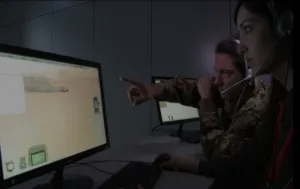At ITEC 2016 Federica Pallavicini – a researcher at the Università di Milano-Bicocca – gave a presentation on the use of virtual reality in the military. Rather than training, though, Pallavicini was concentrating on stress management.
War is, most will agree, one of – if not the most – stressful situations one will ever find themselves in. This stress can lead to major psychological disorders, including PTSD, anxiety and depression. As well as being dangerous, these can reduce operational effectiveness.
In recent years, training methods have been developed to support military personnel and help them to cope with these issues, as well as to become more resilient before deployment.
VR is becoming increasingly common in the military for training and simulation. However, the technology – while advanced – is not enough, by itself. The Università di Milano-Bicocca found that the relationship between technology and training effectiveness is not direct, in fact, but is affected by subjective aspects of the users. This means that it is more important for these VR experiences to be built with the specific objective of a particular training session in mind, rather than focusing on high graphical fidelity (although that also has its place).
Pallavicini said that, “Due to the close bond between the user and the system within virtual environments, it may be impossible to segregate these aspects from design issues when striving to achieve the potential of VR technology. It is the capabilities and limitations of the user that many times will determine the effectiveness of virtual worlds.”
The construction of VR scenarios, based on the subjective experiences of the user and the particular aims of the training, is described as ‘Human-Centred Virtual Reality Training Design’.
The HCVR approach has been tested by an Italian company called Selex ES (a subsidiary of Finmeccanica S.p.A, now merged into Leonardo-Finmeccanica’s Electronics, Defence and Security Systems Sector), in co-operation with the Università di Milano-Bicocca. Tests were run with five members of the Italian Forward Air Controller School, which demonstrated an improvement in the effectiveness of specific VR training scenarios.

